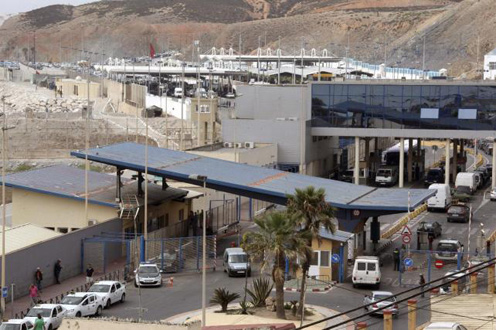With legal and interpreting services
Ministry of Home Affairs to create international asylum and protection offices at border posts in Ceuta and Melilla
News - 2014.11.5
The Ministry of Home Affairs will create international asylum and protection seeker assistance units at the existing border posts in Ceuta and Melilla. The ministerial department headed up by Jorge Fernández Díaz is thus implementing yet another new initiative with which to respond to the unique situation in Ceuta and Melilla; borders experiencing strong migratory pressure in recent years due to their condition as the only land borders between the European Union and the continent of Africa. This project, which will strengthen guarantees in the international protection system and allow improved compliance with requirements of the Common European Asylum System, will be launched in the next few months.
The offices to be set up within the border control zone will be clearly identified as places for formally submitting international asylum and protection applications. This means that applicants will no longer need to leave the border zone to receive the information they need to submit such an application or to formally submit an application.
At these offices - always with assistance from legal and interpreting services as one of the guarantees in the international protection system - those immigrants who could potentially seek international protection will be identified. This means that such immigrants will have the option to formally submit their application to the authorities in charge of the border post (the Spanish National Police Force), which will continue to be accepted or denied by the Office of Asylum and Refuge, a body managed under the Ministry of Home Affairs.
Improved rights and guarantees
All applications formally submitted at these offices will be processed via the so-called "border procedure". While a decision is being taken on their application within the established deadline of eight days, applicants will not be required to remain in the areas provided for this purpose at the border but rather - in what represents an improvement to rights and guarantees - in the territory of Ceuta and Melilla, either at the Temporary Immigration Shelters or in private accommodation if they have the means to do so.
This will constitute a major improvement over current procedure at the border posts in operation at international airports, where applicants must remain in rooms while their application is either accepted or denied.
If an application is accepted, it will continue via the standard processing procedure within the deadlines set by Act 12/2009 of 30 October. If an application is denied, the procedure established by Article 37 of Act 12/2009 of 30 October will be applied.
Implementation of this project will require the Office of Asylum and Refuge to make investments in both the installations (in order to provide the necessary spaces within the border zones) and human resources, given the need to increase the number of staff available to provide this application assistance service (information and application processing), set up the necessary pool of interpreters and meet the needs of application assistance staff.
Furthermore, increased training will be given to those people providing their services at these offices and specialised training will also be required of the police officers present, as well as the lawyers required to offer due legal assistance to applicants.
The unique nature of Ceuta and Melilla
The Ministry of Home Affairs has adopted this measure in response to the unique nature of Ceuta and Melilla. Both these autonomous cities experience a high volume of people crossing the border legally on a daily basis for employment or trade purposes at the established border crossings. However, they also experience strong migratory pressure due to their condition as the only land borders between the European Union and the continent of Africa. An increasing number of large-scale attempts to cross illegally have been made by people trying to gain entry into Spanish - and therefore European - territory while eluding the border controls set up and required by EU regulations.
This imposes some particularly demanding conditions on the State law enforcement agencies responsible for border security, which are required to undertake this essential work of controlling and protecting said borders while fully respecting and allowing full application of the guarantees established in our International Protection System (asylum and refuge).





